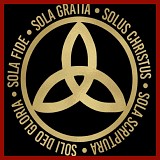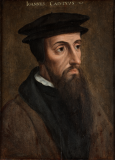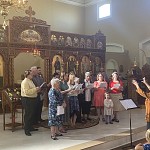There are many theological and practical differences between Orthodox Christianity and Protestant Christianity. The goal of this page is to give inquirers the ability to investigate these dogmatic and doctrinal differences between the Orthodox Church and various Protestant confessions in a respectful manner without misrepresenting either side. May the Holy Spirit guide you in your research.
In this special two-part series, Kevin Allen (Host of Ancient Faith Today) sits down with Father Josiah Trenham, author of the new book Rock and Sand; An Orthodox Appraisal of the Protestant Reformation and Their Teachings. This book has been written for three purposes. First, to provide the Orthodox reader with a competent overview of the history of Protestantism and its major traditions, from its beginnings in the 16th century to the present day. This overview relies heavily upon the Reformer's own words as well as the creeds of various Protestant faiths, in order to avoid misrepresentation and caricature. Second, to acquaint Orthodox and non-Orthodox readers with a narrative of the historical relations between the Orthodox East and the Protestant West. Finally, to provide a summary of Orthodox theological opinion on the tenets of Protestantism.
Sola Scriptura - The Protestant doctrine that Scripture, is the final, and sole infallible authority for faith and practice.
- Contra Sola Scriptura (1 of 4) - Book Review: The Shape of Sola Scriptura. By Keith A. Mathison. (2001)
- Contra Sola Scriptura (2 of 4) - The Biblical Basis for Holy Tradition
- Contra Sola Scriptura (3 of 4) - Where Does Sola Scriptura Come From?
- Contra Sola Scriptura (4 of 4) - Protestantism’s Fatal Genetic Flaw: Sola Scriptura and Protestantism’s Hermeneutical Chaos
- Sola Scriptura vs. Holy Tradition | Father Josiah Trenham - Interview of Fr. Josiah on YouTube
- How to Read the Bible - An Orthodox approach to the Scriptures
Sola Gratia - The Protestant doctrine that salvation comes by divine grace or "unmerited favor" only, not as something earned or deserved by the sinner.
Solus Christus - The Protestant doctrine that salvation is by faith in Christ alone.
Sola Fide - The Protestant doctrine that it is on the basis of faith that believers are made right of their transgressions of the law of God rather than on the basis of what Paul calls "works of the law", sometimes called good works.
- Response to Michael Horton - Are Eastern Orthodoxy and Evangelicalism Compatible? NO
- Response to Theodore — Semi-Pelagianism, Sola Fide, and Theosis
- Faith Alone Refuted | Fr. Josiah Trenham - YouTube interview with Fr. Josiah.
Soli Deo Gloria -The doctrine that everything is done for God's glory to the exclusion of mankind's self-glorification and pride.
Reformed Christianity is rooted in the sixteenth-century reforms begun by Martin Luther (1483–1546), yet developed on a separate path. Such major reformers as Ulrich Zwingli (1484–1531) and John Calvin (1509–64), as well as Martin Bucer (1491–1551), John Knox (c. 1513–72), and Heinrich Bullinger (1504–75), gave impetus to the movement. The Reformed agreed with Luther's criticisms of Roman Catholicism but disagreed on certain theological issues. Calvin's writings, especially his Institutes of the Christian Religion, articulated Reformed theology. (https://www.encyclopedia.com/religion/encyclopedias-almanacs-transcripts-and-maps/christianity-reformed-christianity)
Orthodox-Reformed Bridge - "Calvinism and Orthodoxy operate from two different theological paradigms. There is a need for theological translators who can explain the differences and commonalities between two great Christian theological traditions. It is my hope that I can help Calvinists interested in Orthodoxy come to a better understanding of Orthodoxy and perhaps cross over to the other side."
Substitutionary atonement and the Church Fathers - "This paper will examine these quotations cited in Pierced for Our Transgressions in the context of each patristic author’s larger soteriology." "It will be concluded that while the church fathers do clearly teach substitutionary atonement, they do not teach penal substitution as understood by Jeffery, Ovey, and Sach. Rather, the dominant pattern found in these patristic writers is substitutionary atonement understood within the conceptual framework of restorative justice."




